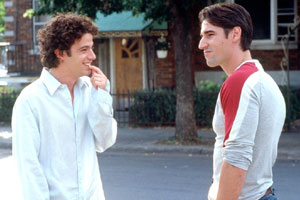Canada's BiG Gay Italian Fat Wedding Comedy Strikes Universal Chord

Mambo Italiano - Paul Fischer at the Toronto Film Festival.
Can a small Canadian comedy called Mambo Italiano do for gay relationships what My Big Fat Greek Wedding did to, well, marriage and Moussaka? Already the word is out that this small, fresh and energetic comedy can be the next big thing, as could its hunky stars, Luke Kirby and Peter Miller who play lovers in this coming out and coming-of-age comedy. PAUL FISCHER reports.In Mambo Italiano, A handsome, young aspiring Canadian TV show writer, Angelo, decides to move in with his cop boyfriend, Nino, whom he's known since they were kids. Upon doing so, he's faced with the challenge of how to pull off the move, without his Italian immigrant parents discovering the truth about his sexuality--even as they're trying to set him up with a nice Italian-Canadian girl.
It's no surprise that Mambo Italiano is being compared with last year's sleeper hit, My Big Fat Greek Wedding. After all, we have an ethnic group coping with family and first love, and a plethora of food, over protective parents and the outsider theme that resonated in that Greek movie. This time around, however, gay relationships are treated with a certain comic freshness, as was the original stage play. Mambo Italiano, based on the hit stage comedy, profiles Angelo (newcomer Luke Kirby), a struggling TV writer who comes out of the closet to his conservative, very Italian parents after chatting with a volunteer at a gay help line. His orthodox folks, played by Paul Sorvino and Ginette Reno, struggle to come to terms with the news while his police officer lover tries to hide his sexual orientation fearing the world's reaction. The film has garnered buzz as this year's runaway hit, much like My Big Fat Greek Wedding. It's been sold to over 30 countries as a wide-release motion picture.
"We're glad that My Big Fat Greek Wedding was a success because it made people around the world feel good," says star Kirby, in a sparse Toronto hotel room. "This film is a make-you-feel-good movie also, but that's where the comparison stops."
Comparisons with Greek Fat Wedding may be rife, but unlike Nia Vardalos' s bride in, Angelo must deal with a real life prejudice that continues to create political tension - homophobia. In taking a male lover, Angelo brings great shame to the family. "There's no fate worse than being gay and Italian," he explains to the volunteer on the help line.
Upon learning the news, his melodramatic father declares "my life is one big disappointment" and even scolds his wife for pulling their son out of hockey claiming, "Hockey would have made him normal." The situation quickly changes after Angelo's boyfriend dumps him so he can lead a so-called "normal" existence with a "nice" Italian girl.
"When I read the script it was not a story about homosexuals," said veteran actor Paul Sorvino. "It was a story about human beings. It was a story about love conquers all."
He said he hoped that as a parent he'd have the courage to give his children, including daughter Mira, unconditional love no matter what choices they make. "I don't know what would have been worse: If Mira had come home one day to say she was gay or an actress", he decries with a boisterous laughter.
The film's gay protagonists are played by newcomers Luke Kirby and Peter Miller, Canadian natives, hoping for bigger and better things as a result of Mambo. Both actors agree that being straight as gay characters [mind you neither are of Italian ethnicity if the truth be told] increases pressure from the gay community. Says Kirby: "I can understand why a pressure would sort of come to life, but you know, as soon as I get the job, you know, it is acting, and it's your job to commit to whatever it is your actions are for that period of time, so, hopefully, people will understand that." The pair had to kiss for their final audition, and co-star Peter Miller recalls the experience with a degree of wry nonchalance. "It was early in the morning, and you're getting up and I was kind of dishevelled. It was as comfortable as you can hope it would be, I suppose." While neither nether are gay nor Italian, that didn't prevent either actor from understanding their respective characters. "I understood Angelo and his strange experiences of high school feeling ostracised, and from that sort of sardonic tone, being born, from maybe a few too many taunts and teases," the 24-year old actor says.
Peter Miller had the tougher job of playing a character that is never fully comfortable with his homosexuality, and also felt a connection to Nino, who ultimately goes out of his way to reject his sexuality. "I related to him, but I don't want to get too personal in my life," Miller says reservedly. "It's just that I understand he feels a lot of pressure, and responsible for too many people. He feels like he has a certain image to uphold because of the way, maybe of his single, Italian mother background, as well as the way he looks. There's this built-in expectation of how he should be, so when you got to play the part, you got to be able to understand him." Nino's ultimate decision to go all out and reject his sexuality, is an emotional focal point in the film, but Miller feels that if they ever made a sequel, Nino would comes to terms with being gay. "I think that with the experiences Nino went through in the film, he took some big steps towards eventually being himself, so I think that he's going to have the strength and the clarity to say, 'You know, I don't want this life', and I think he's gay, because if you're in love with a man, and you live with a man for a period of time then, I mean, absolutely, you're gay."
Neither actor had to go very far to research their roles. After all, Kirby insists, "it's something that's always been present in my surroundings, and something that was easy to talk about. [Playwright] Steve Galluccio was a wonderful information guide, because he bore the beast and I think that Angelo and Steve probably have a lot of similarities in their tone and their frustrations with the world."
Those frustrations aren't unique to the gay community, and Miller insists that despite its thematically gay elements, Mambo Italiano is far broader than that. "I just feel that it's the experience of a family, in particular, his family, and a smaller family, my mother and I. I think it's universal in that sense and I don't think it's a gay movie. Rather it tells certain things through our relationship."
For veteran actor Paul Sorvino, who has some of the funniest moments in the film, the attraction of Mambo Italiano, was simple. "When I read it, I knew it attracted the subject with humour, understand and truth, and with a fresh way of doing it, so I said: I want to be a part of this movie." Sorvino says that he understood where his character, the overprotective Gino, comes from, because, along with his equally doting wife in the film, "are ennobled by their capacity to love and they are ennobled by the fact that they'll NEVER understand the sociological implications of their son being gay; they'll never understand the psychological underpinnings of being gay. But they don't have to - they just want their son, and I think that's magnificent." Sorvino agrees with his younger co-stars, that it's not merely a gay film and thus has a much broader context. "People ought to see this movie because it's very funny and they can get touched in the process. There's also lot of truth to it, with the kid who wants to come out, who's gay and can't stand the secrecy of it, but ultimately love conquers all, and gay or straight, don't we all want to believe that? I would that if this was to happen to me, and one of my kids had come and told me he or she was gay, I would say: Do you know what you're getting into here? But if that's the only way you can live, then I love you, and that's the theme of this movie I think."
Adds Kirby: "But most people, whether they care to admit it or not, have had the experience with someone who they care about coming out of the closet. I think that that's a fair reason why anyone would go to see it at all. This is a movie that isn't specific to a gay audience, and wasn't built to make the divide stronger. If there was any sort of sociological intention, which I doubt they would like me to talk about, it's a film about acceptance. Angelo's not happy in his Italian neighbourhood, but he's not going to be happy in the village, either. He's a guy who doesn't like the sense that you have to pick one box to live in versus another, so I think that the movie IS about acceptance, which is the beautiful thing about it."
MORE





